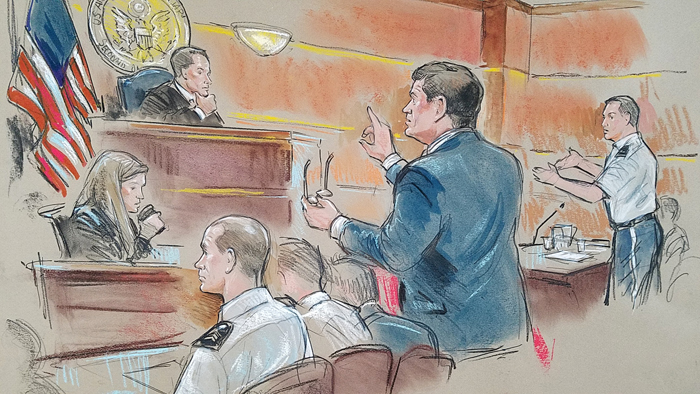In a recent case, the Law Office of Will M. Helixon represented a client in a court-martial case involving allegations of sexual assault that was later “withdrawn and dismissed,” and referred to an Administrative Separation Board. A great result in that the accused no longer faced prison or sex offender registration, but the Board was merely a “formality” to separation of the Soldier with an Other Than Honorable (OTH) Discharge. This blog discusses the importance of live or telephonic witnesses and cross-examination at an administrative separation board, and criticizes the Government’s use of “paper-only” Boards as a means to separate Soldiers.
Consequences of an OTH Discharge
In the United States military, there are several types of discharges, one of which is known as an Other Than Honorable discharge (OTH). An OTH is a form of military discharge that is less than an honorable discharge and can have a significant impact on a service member’s future.

One of the most significant consequences of an OTH is the loss of benefits that are typically afforded to those who receive honorable discharges. For example, service members with OTHs are not eligible for Montgomery GI Bill or Post-911 GI Bill benefits, which provide financial assistance for education, training, and housing. Additionally, they may be disqualified from receiving other forms of veterans’ benefits, such as VA healthcare, disability compensation, and life insurance.
Another negative consequence of an OTH is the impact it can have on career opportunities. Many civilian employers require job applicants to provide proof of prior military service, and an OTH can be viewed as a negative mark on a service member’s record. Some employers may even have policies against hiring individuals who have received OTHs or other types of less-than-honorable discharges.
Often less talked about, in addition to the loss of benefits and reductions in career opportunities, an OTH can also have serious social and emotional consequences. Service members who receive OTHs may, in some cases, face stigmatization from their peers and society at large, which can be isolating and lead to negative mental health outcomes. Additionally, the process of receiving an OTH can be traumatic and may lead to feelings of shame, guilt, and regret on the part of the service member.
In some instances, service members with OTH discharges may be more likely to experience financial difficulties or homelessness due to the lack of resources available to them. This can lead to a cycle of hardship and vulnerability that is difficult to escape, leading to long-term consequences for their personal and professional lives.
Furthermore, a discharge of any kind, but especially one with an OTH, may affect a service member’s identity and sense of purpose. After serving in the military, many service members rely on the community and sense of belonging that comes with serving in the armed forces. A negative discharge can shatter that sense of identity, leaving service members feeling lost and disconnected from the community.
Paper-Only Boards: Not Contemplated by Regulation or Practice
Administrative Separation Boards are governed in the Army by Army Regulation 635-200, Chapter 2, Procedure for Separation, Section II – Administrative Board Procedures (paragraphs 2-4 to 2-12). Paragraph 2-8, aptly entitled “Witnesses” clearly contemplates that live or telephonic witness would be called at an Administrative Separation Board and provides, “the appropriate commander will ensure that no witness is transferred or separated before the beginning of a board hearing, except when an enlistment or period of service fixed by law expires. In such cases, an attempt will be made to obtain the Soldier’s consent to retention. If he or she does not consent, a deposition or affidavit will be obtained, as appropriate.”
In paragraph 2-9, Board Procedures, the Respondent is provided the guarantee to have access to witnesses against him when it provides, “the Soldier will be notified of names and contact information of witnesses expected to be called at the board hearing. The Soldier will also be notified that the recorder of the board will, as provided below, and upon request of the Soldier, try to arrange for the physical or telephonic presence of any available witness that he or she desires. A copy of the case file, including all affidavits and depositions of witnesses unable to appear in person at the board hearing will be furnished to the Soldier or the counsel as soon as possible after it is determined that a board will hear the case.”
 Nowhere in Section II, Administrative Board Procedures, does the regulation contemplate introduction of only written materials, including law enforcement reports and sworn statements. The only mention of written statements at the Board is in paragraph 2-9d when discussing the right of the Respondent to have witnesses produced for the Board and when the Respondent requests temporary duty (TDY) orders for the production of such witnesses — only then must the Respondent provide, “an explanation as to why written, recorded, or telephonic testimony would not be sufficient to provide for a fair determination.” Otherwise, the regulation is silent on the introduction of witness statements as a sole alternative to live or telephonic testimony.
Nowhere in Section II, Administrative Board Procedures, does the regulation contemplate introduction of only written materials, including law enforcement reports and sworn statements. The only mention of written statements at the Board is in paragraph 2-9d when discussing the right of the Respondent to have witnesses produced for the Board and when the Respondent requests temporary duty (TDY) orders for the production of such witnesses — only then must the Respondent provide, “an explanation as to why written, recorded, or telephonic testimony would not be sufficient to provide for a fair determination.” Otherwise, the regulation is silent on the introduction of witness statements as a sole alternative to live or telephonic testimony.
Army Regulation 635-200, paragraph 2-9f does reference Army Regulation 15-6 for additional guidance governing the board procedures. It provides “except as modified per this regulation, the board will conform to the provisions of AR 15-6 applicable to formal proceedings with respondents. As an exception to AR 15-6, expert medical and psychiatric testimony routinely may be presented in the form of affidavits. However, if the Soldier desires to present such evidence, he or she is entitled to have the witnesses appear in person, if they are reasonably available.” AR 15-6, Paragraph 3-8 provides for the productions of witnesses and does allow for witness statements as alternatives to live testimony, however the regulation clearly states that “witness statements normally will be elicited by questions and answers when using the board procedure, or if the appointing authority has directed a verbatim record. Narrative testimony may be used when appropriate.” While providing for the use of witnesses prior statements, AR 15-6, paragraph 3-8(c)(5) prefaces the use of such statements with the caveat that “the direct testimony of witnesses is preferable.”
So what does counsel do when the Government chooses NOT to call any witnesses and relies instead solely on the use of witnesses prior statements and other documentary evidence at an Administrative Separation Board? Although not a basis for preventing the Board, I recommend objecting to the Board for not considering the live or telephonic witnesses during the proceedings, and objecting to the approval authority that available witnesses were not called by the Government. This may serve as the basis for challenging the results of the Board at a subsequent proceeding before the Army Board of Corrections for Military Records. The basis for such objection is that witness statements are insufficient to live testimony and the Respondent was denied cross-examination of witnesses against him or her.
Witness Statements are a Poor Substitute for Live Testimony
In administrative separation proceedings, the presentation of evidence is critical to the success of the Government’s case. When a military member is charged with misconduct, the Government needs to put forward sufficient evidence to prove the allegations by the preponderance of evidence. Often, there are multiple sources of evidence available, including witness statements, documentary evidence, and live witnesses. While witness statements can provide valuable information, they are not a substitute for live testimony.
Importance of Live Testimony
Live testimony provides the opportunity for witnesses to give their account of events in their own words. It allows for the questioning of the witness, providing the opportunity to clarify or elaborate on statements. Live testimony also allows for the opportunity to assess the credibility of the witness, including their demeanor, tone, and nonverbal cues. In contrast, witness statements are a second-hand account of events, which can be influenced by bias or misunderstanding. Statements may also lack context or details that are crucial to the understanding of events. Additionally, statements are not subject to cross-examination (which will be addressed later), which can make them less reliable than live testimony.
The ability to assess the credibility of a witness is especially important in cases where there may be conflicting accounts of events. In my recent case, the Respondent steadfastly denied the allegations and provided sworn testimony at the Board. Statements can only provide limited information and may not be able to give the full picture of what occurred. Furthermore, a live witness can provide important corroboration or contradiction of witness statements. Another important aspect of live testimony is the ability of the Board to observe the demeanor of witnesses and determine whether they are truthful and reliable. This is particularly important in cases where character and reputation are at issue.
An obvious drawback of witness statements is that they lack the opportunity for cross-examination. Statements may not provide the full picture of what occurred or may contain inaccuracies due to inconsistencies or gaps in the witness’s memory. Furthermore, statements cannot provide an opportunity to assess the credibility of the witness, which can be crucial in determining the truthfulness of the evidence provided.
The Importance of Cross-Examination at a Board Proceeding
An administrative separation board serves as an essential process in the United States Army to ensure the maintenance of discipline and good order within the military. Administrative separation is a process that involves a service member being discharged without punitive measures, although with potential signification consequences as noted above. This process usually happens when a service member has been alleged to have engaged in misconduct. Administrative Separation Boards hear cases of such service members and decide whether they should be discharged or not. A crucial aspect of the process is the cross-examination of witnesses. The cross-examination of witnesses plays a vital role in the determination of the facts of the case and ensuring that justice is served.
Defining Cross-Examination at an Administrative Separation Board
Cross-examination is a legal process that involves questioning a witness who has already testified in a case by the opposing counsel to verify or challenge the witness’s testimony. Cross-examination is critical in determining the credibility of witnesses and the facts of the matter at hand. It is only during cross-examination that the opposing counsel can question the reliability and truthfulness of the witness’s testimony. This process allows the board to gain a complete understanding of the facts of the case and make a fair and just decision.
The Importance of Cross-Examination
Cross-examination is an essential aspect of an Administrative Separation Board. It provides the board with an opportunity to verify the witness’s credibility, the accuracy of their testimony, and their motives for giving evidence. The following are some reasons why cross-examination is crucial in an Administrative Separation Board:
1. Verifying the Accuracy of the Evidence
One primary reason for cross-examining witnesses in an Administrative Separation Board is to verify the accuracy of the evidence presented. Cross-examination enables the opposing counsel to challenge the witness’s testimony and test the witness’s memory and perception of the events in question. By cross-examining the witness, the opposing counsel can clarify any discrepancies that may exist and ensure that the evidence presented is accurate and reliable.
2. Challenging the Witness’s Credibility
Cross-examination of a witness also allows the opposing counsel to challenge the witness’s credibility. The opposing counsel can question the witness’s ability to remember details, their motive or bias, and their perception of the situation. By questioning the witness’s credibility, the Board can determine whether the witness is reliable or not. This is especially important because the decision of the board is based on the evidence presented. Therefore, if the witness is unreliable, the decision reached by the board may be unjust.
3. Identifying and Clarifying Inconsistencies
Cross-examination is also crucial in identifying and clarifying inconsistencies in the evidence presented. The opposing counsel can question the witness about discrepancies in their testimony, and by doing so, inconsistencies in the evidence presented can be identified. The opposing counsel can then take steps to clarify the inconsistencies and ensure that the evidence presented is accurate and reliable.
4. Establishing Facts
Another importance of cross-examination is that it enables the board to establish facts. Through cross-examination, the board can gain a complete understanding of the facts of the case. By questioning the witness, the board can determine the who, what, when, where, why, and how of the events in question. This complete understanding of the facts is essential because it enables the Board to make a fair and just decision.
5. Detecting Biases and Motives
Cross-examination is also essential in detecting biases and motives that the witness may have. By questioning the witness, the opposing counsel can determine any motives the witness may have for giving evidence. This is particularly important because witnesses may have ulterior motives for their testimony, such as seeking revenge against the accused. By identifying biases and motives, the board can determine the credibility of the witness and make a fair and just decision.
Conclusion
Given the consequences facing Service Members from separation from the military with an Other Than Honorable Discharge, the use of “paper-only” boards is fundamentally unfair. Not only are the reliance on prior witness statements instead of live testimony misplaced, but cross-examination of witnesses is crucial in an administrative separation board. It provides the board with an opportunity to verify the witness’s credibility, establish the facts of the case, and determine the accuracy of the evidence presented. It also protects the accused’s due process rights and ensures that the decision reached by the board is fair and just. Therefore, Boards must hold the Government accountable to present their case, and utilized live or telephonic witnesses to ensure that the cross-examination process is carried out effectively to ensure that justice is served.
More about the Law Office of Will M. Helixon
Will M. Helixon established the Law Office of Will M. Helixon in February of 2016. Originally headquartered in Kansas City, Missouri, the firm’s original mission was to defend members of the military in courts-martial, adverse administrative proceedings and other criminal proceedings. Today, the firm has worked as technical and legal advisors in multiple complex and high-profile military cases. The firm now handles most military matters, including medical issues involving the MEB/PEB process, adverse administrative matters, military justice matters, and legal assistance matters, including the correction of military records. No longer in Kansas City, the firm now has a European office physically located in Vilseck, Germany. Call us today to assist with your legal issue in Germany or the United States. All military lawyers at the Law Office of Will M. Helixon maintain licenses to practice before all military trial courts.
Law Office of Will M. Helixon – Germany, Hans-Ohorn-Platz 7, First Floor, 92249, Vilseck, Germany.
Germany +49 (0) 9662-293-8047
United States (913) 353-6466

